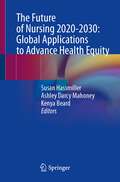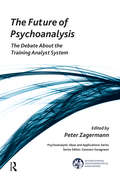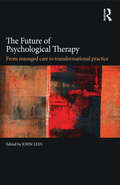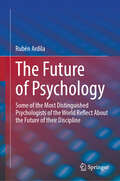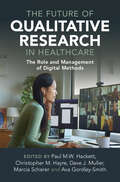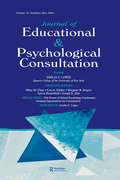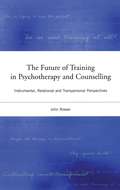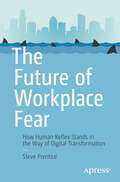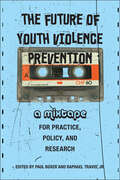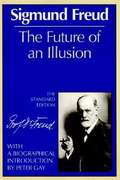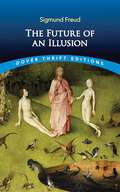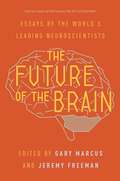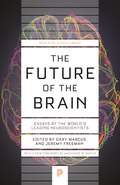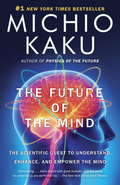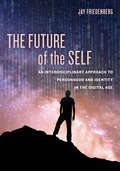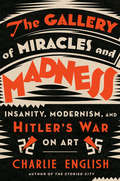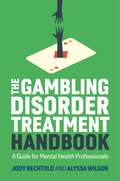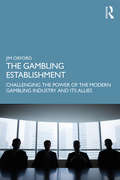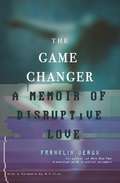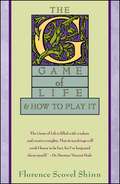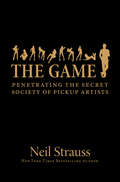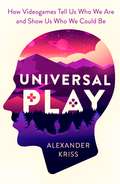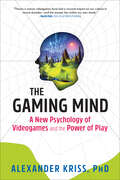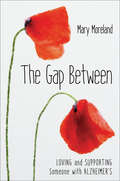- Table View
- List View
The Future of Nursing 2020-2030: Global Applications to Advance Health Equity
by Susan Hassmiller Ashley Darcy Mahoney Kenya BeardThis book provides an application of the concepts and recommendations of The Future of Nursing 2020-2030: Charting a Path to Achieve Health Equity Report, a Consensus Study from the US National Academy of Medicine. It offers complementary guidance through tools, tips, examples and storytelling. As such this book, written by prominent international academics and nurse practitioners, offers program and policy recommendations for health equity. As the world’s largest and most trusted workforce, nurses are in a key position thus must step up to help address these inequities now. The recent pandemic has laid bare these inequities in ways that are stark and demanding of our attention. This book offers program and policy recommendations, along with case studies, designed to empower nurses to understand and ACT to improve health equity. This text provides nurses an opportunity to clearly see the need for an equitable, just, and fair society. There has never been a more urgent call to action.
The Future of Psychoanalysis: The Debate About the Training Analyst System (The International Psychoanalytical Association Psychoanalytic Ideas and Applications Series)
by Peter ZagermannThis book is concerned with the question of what psychoanalytic training should look like today. Should we go on with the system that has developed over time? Or should we abandon it, and if so, for which reasons?It provides a detailed and compelling account of the ongoing, sometimes heated, international debate about psychoanalytic training. After nearly a century since the onset of formal psychoanalytic training in the 1920s in Berlin, experiences with the prevalent Eitingon model are presented and looked at from different perspectives. Experienced psychoanalysts from all the regions of the psychoanalytic world and from different schools of psychoanalytic thought and clinical conceptualizations share their ideas, critique, and on occasion, their diagnoses. Perhaps no other topic of present-day scientific discussion in the field is as prone to evoke more controversial and passionate reactions than the subject of training.
The Future of Psychological Therapy: From Managed Care to Transformational Practice
by John LeesThe psychotherapy and counselling profession has recently experienced far-reaching changes because of the development of evidence-based medicine and managed care systems. The Future of Psychological Therapy brings together leading counsellors, psychotherapists, psychological therapists and managers to address how these changes are beginning to affect all aspects of the psychotherapy and counselling profession. It evaluates the impact of these developments, shows how they affect practitioner’s capacity to care, anticipates future developments and offers a coherent and viable approach to research and practice. The book draws on psychotherapeutic theory to develop insight into managed care and engages in qualitative microphenonena research into the complexities of clinical practice drawing on cutting edge developments. It aims to establish a balanced counselling and psychotherapy profession by: opening up a debate about these far-reaching developments which threaten the profession, challenging the rhetoric of accountability, audit, transparency and measurement of care, exposing the danger of sleeping through these momentous changes in the counselling and psychotherapy profession. The Future of Psychological Therapy is a timely and important book, examining the psychotherapy profession's approach to managed care and evidence-based research, and discussing whether a balanced, coherent and viable counselling and psychotherapy research and practice culture can be established. It will be of interest to practitioners, academics and policy makers in the field, non-clinical professionals and anyone who is interested in psychological therapy and addressing the worldwide deterioration in psychological health.
The Future of Psychology: Some of the Most Distinguished Psychologists of the World Reflect About the Future of their Discipline
by Rubén ArdilaThis book brings together interviews with some of the most distinguished psychologists at the beginning of the 21st century on a world-wide level. It is a reflection about the future of psychology that presents the concepts, ideas, reflections, doubts, dreams and desires of the leaders of psychology at the dawn of the third millennium. Participants are 48 renown psychologists – including former presidents of the American Psychological Association (APA) and former and current presidents of the International Union of Psychological Science (IUPSyS) – from 24 countries: Argentina, Australia, Belgium, Canada, China, Czech Republic, Colombia, Cuba, England, France, Germany, Mexico, The Netherlands, Nigeria, Philippines, Poland, Russia, Singapore, South Africa, Spain, Sweden, Turkey, the United States and Venezuela. The Future of Psychology: Some of the Most Distinguished Psychologists of the World Reflect About the Future of their Discipline will be of interest to both researchers and practitioners from all subfields of psychology who are interested in learning what are the most important challenges and opportunities to psychological research and practice in the 21st century.
The Future of Qualitative Research in Healthcare: The Role and Management of Digital Methods
by Marcia Scherer Christopher M. Hayre Dave J. Muller Ava Gordley-Smith Hackett, Paul M. W.Digital methods in healthcare research have been steadily gaining ground but, until recently, were superseded by conventional face-to-face approaches wherever possible. However, the COVID-19 pandemic rendered in-person forms of data collection largely impossible, propelling digital approaches to the forefront. This book offers a digital lens in the participatory perspective of ethnography, a qualitative methodology. A series of chapters from internationally distinguished and rising authors present digital platforms and techniques and apply these to a wide range of healthcare studies. The authors highlight the different aspects of digital research approaches as well as reflecting on and proffering digital approaches to qualitative research for the future. Will these new digital health techniques be embraced, or will researchers be keen to revert to the traditional methods? With its unique approach, this is an invaluable resource for both prospective and experienced qualitative researchers in a broad array of medical and health disciplines.
The Future of School Psychology Conference: Framing Opportunties for Consultation: A Special Double Issue of the Journal of Educational and Psychological Consultation
by Emilia C. LopezFirst published in 2005. This Volume 15, numbers 3 and 4 of the Journal of Educational and Psychological Consultation 2004 and has the future of school psychology conference- ‘framing opportunities for Consultation' as its special focus.
The Future of Training in Psychotherapy and Counselling: Instrumental, Relational and Transpersonal Perspectives
by John RowanThe Future of Training in Psychotherapy and Counselling presents a revealing and stimulating account of the current state of training that demonstrates how training will have to adapt if it is to sucessfully meet the needs and challenges of the future.In an attempt to look afresh at the whole question of training, John Rowan proposes that there are three ways of doing therapy and any examination of training has to consider each of these:* the instrumental, where the main emphasis is on the treating the client or patient * the authentic way, where the main emphasis is on meeting the client or patient* the transpersonal way, where main emphasis is on linking with the client in a more personal way. Each approach makes different assumptions about the self, about the relationship, and about the level of consciousness involved in doing therapy. By challenging the basic precepts of traditional training, John Rowan encourages the reader to reconsider subjects including the difference between counselling and psychotherapy, culture and ethics, the origins of disturbance in clients, and child development. The Future of Training in Psychotherapy and Counselling provides a much needed new perspective that will compel all psychotherapists and counsellors to take a closer look at training in the field.
The Future of Workplace Fear: How Human Reflex Stands in the Way of Digital Transformation
by Steve PrenticePeople who discuss digital transformation often focus on new technology with a presumption that the working population will embrace it enthusiastically. But human beings are still instinctively dominated by fear, a single complicating reflex which will always be the default response.Workplace fear comes in many forms, including the fear of change, the fear of looking stupid, and the fear of working relationships, and in all cases these fears have deep roots that extend far below having to learn a new technology. It’s about the fear of losing a job, a livelihood, and an identity.The results of such fear can have enormous repercussions on an organization, including increased vulnerability to ransomware and cyberattack, increased employee turnover, loss of competitiveness, loss of market share, resistance, sabotage, discrimination, and litigation.Steve Prentice is an expert in the relationship between people, technology, and change. This book will demonstrate to managers and employees alike the various types of fear that can occur in the workplace in the context of digital transformation, how these fears can impact productivity, team dynamics, and corporate health, and most importantly, how to overcome them.Using case studies of digital transformation successes and failures, Steve describes:How fear grows in the body and mindHow fear radiates and spreads through groups and teamsHow fear interacts with technology, change, and digital transformationHow ignoring or suppressing fear leads to tangible risks to an organization’s futureHow to address and manage fear individually and as a groupHow the demands of modern employees have changedHow managers can prepare themselves for the new normalWho This Book Is For Managers who wish to look under the hood and understand how people respond to the changes in their immediate world, and why most of those responses are negative. It will also be an uplifting read for individual employees who seek to understand why they, or their colleagues or managers, generally respond negatively to changes, or who struggle with conflict and relationships in the workplace and how to create an action plan to improve the situation.
The Future of Youth Violence Prevention: A Mixtape for Practice, Policy, and Research
by Jean Rhodes Jorja Leap Karen L. Bierman Joel M. Caplan Neal Halfon Demetrius Smith Raymond W. Novaco Jonathan Jay Stephanie Bonne Janice Johnson Dias Stanley J. Huey Jaleel Abdul-Adil Elizabeth S. Barnert Fiorella L. Carlos Chavez Liza Chowdhury Isaias Contreras Zion Crichlow Katrina J. Debnam Robyn D. Douglas Noni K. Gaylord-Harden Alejandro Gimenez-Santana Cheryl Grills Matthew Hagler Casey Keene Katherine Kelton Jill Kochanek Joyce Lee Marsha Levick Krista Mehari Shenna Morris Sierra Mullan Corey Prachniak-Rincón Peter H. Rej Joseph B. Richardson Emily N. Satinsky Ashli J. Sheidow Rebecca Slotkin Claire Terrebonne William Wical Samson StylesThe Future of Youth Violence Prevention: A Mixtape for Practice, Policy, and Research focuses on innovative approaches to youth violence prevention that utilize consistent principles found within existing best practices but are dynamic and adaptable across settings—and the sociohistorical and cultural realities of those settings. This book features scholars anchored in applied practices who can ground these forward-thinking strategies in the substantive base of research and theory that has produced successful interventions across multiple disciplines. The scholarship and cutting-edge thinking assembled in this volume could produce new-era youth violence prevention coordinators prepared to serve in any setting—including community outreach programs, therapeutic group homes, day reporting centers, juvenile probation offices, schools, or clinics. These coordinators will be able to cocreate intervention techniques using core prevention elements drawing from a range of ideas and a multitude of disciplines while embracing the assets and resources already in place.
The Future of an Illusion
by Sigmund Freud James StracheyIn the manner of the eighteenth-century philosopher, Freud argued that religion and science were mortal enemies. Early in the century, he began to think about religion psychoanalytically and to discuss it in his writings. The Future of an Illusion (1927), Freud's best known and most emphatic psychoanalytic exploration of religion, is the culmination of a lifelong pattern of thinking.
The Future of an Illusion (Dover Thrift Editions: Psychology)
by Sigmund FreudIn The Future of an Illusion, Freud’s psychoanalysis of religion is the culmination of a lifelong thought pattern. Freud examines human nature and the role of religion in society, proclaiming that human instincts are destructive to civilization and must be restrained to maintain an orderly society. Religion, viewed as a set of false beliefs based on human desires, manifests as a God-like father figure to a helpless child, whose survival is dependent upon delusional beliefs for independence, security, and incentives for good behavior. Declaring religion and science as mortal enemies, Freud concludes that civilization can only be redeemed through new constructions of existence and ideas motivated by science.
The Future of the Brain: Essays by the World's Leading Neuroscientists
by May-Britt Moser Edvard I. MoserThe world's top experts take readers to the very frontiers of brain scienceIncludes a chapter by 2014 Nobel laureates May-Britt Moser and Edvard MoserAn unprecedented look at the quest to unravel the mysteries of the human brain, The Future of the Brain takes readers to the absolute frontiers of science. Original essays by leading researchers such as Christof Koch, George Church, Olaf Sporns, and May-Britt and Edvard Moser describe the spectacular technological advances that will enable us to map the more than eighty-five billion neurons in the brain, as well as the challenges that lie ahead in understanding the anticipated deluge of data and the prospects for building working simulations of the human brain. A must-read for anyone trying to understand ambitious new research programs such as the Obama administration's BRAIN Initiative and the European Union's Human Brain Project, The Future of the Brain sheds light on the breathtaking implications of brain science for medicine, psychiatry, and even human consciousness itself.Contributors include: Misha Ahrens, Ned Block, Matteo Carandini, George Church, John Donoghue, Chris Eliasmith, Simon Fisher, Mike Hawrylycz, Sean Hill, Christof Koch, Leah Krubitzer, Michel Maharbiz, Kevin Mitchell, Edvard Moser, May-Britt Moser, David Poeppel, Krishna Shenoy, Olaf Sporns, Anthony Zador.
The Future of the Brain: Essays by the World's Leading Neuroscientists (Princeton Science Library #146)
by Gary Marcus and Jeremy FreemanThe world's top experts take readers to the very frontiers of brain scienceIncludes a chapter by 2014 Nobel laureates May-Britt Moser and Edvard MoserAn unprecedented look at the quest to unravel the mysteries of the human brain, The Future of the Brain takes readers to the absolute frontiers of science. Original essays by leading researchers such as Christof Koch, George Church, Olaf Sporns, and May-Britt and Edvard Moser describe the spectacular technological advances that will enable us to map the more than eighty-five billion neurons in the brain, as well as the challenges that lie ahead in understanding the anticipated deluge of data and the prospects for building working simulations of the human brain. A must-read for anyone trying to understand ambitious new research programs such as the Obama administration's BRAIN Initiative and the European Union's Human Brain Project, The Future of the Brain sheds light on the breathtaking implications of brain science for medicine, psychiatry, and even human consciousness itself.Contributors include: Misha Ahrens, Ned Block, Matteo Carandini, George Church, John Donoghue, Chris Eliasmith, Simon Fisher, Mike Hawrylycz, Sean Hill, Christof Koch, Leah Krubitzer, Michel Maharbiz, Kevin Mitchell, Edvard Moser, May-Britt Moser, David Poeppel, Krishna Shenoy, Olaf Sporns, Anthony Zador.
The Future of the Mind: The Scientific Quest to Understand, Enhance, and Empower the Mind
by Michio Kaku#1 NEW YORK TIMES BESTSELLER • The renowned theoretical physicist and national bestselling author of The God Equation tackles the most fascinating and complex object in the known universe: the human brain.&“Compelling…Kaku thinks with great breadth, and the vistas he presents us are worth the trip.&” —The New York Times Book ReviewThe Future of the Mind brings a topic that once belonged solely to the province of science fiction into a startling new reality. This scientific tour de force unveils the astonishing research being done in top laboratories around the world—all based on the latest advancements in neuroscience and physics—including recent experiments in telepathy, mind control, avatars, telekinesis, and recording memories and dreams. The Future of the Mind is an extraordinary, mind-boggling exploration of the frontiers of neuroscience. Dr. Kaku looks toward the day when we may achieve the ability to upload the human brain to a computer, neuron for neuron; project thoughts and emotions around the world on a brain-net; take a &“smart pill&” to enhance cognition; send our consciousness across the universe; and push the very limits of immortality.
The Future of the Self: An Interdisciplinary Approach to Personhood and Identity in the Digital Age
by Jay FriedenbergWe live in the digital age where our sense of self and identity has moved beyond the body to encompass hardware and software. Cyborgs, online representations in social media, avatars, and virtual reality extend our notion of what it means to be human. This book looks at the progression of self from the biological to the technological using a multidisciplinary approach. It examines the notion of personhood from philosophical, psychological, neuroscience, robotics, and artificial intelligence perspectives, showing how the interface between bodies, brains, and technology can give rise to new forms of human identity. Jay Friedenberg presents the content in an organized and easy-to-understand fashion to facilitate learning. A gifted researcher, author, and classroom teacher, he is one of the most influential voices in the field of artificial psychology.
The Gallery of Miracles and Madness: Insanity, Modernism, and Hitler's War on Art
by Charlie EnglishThe untold story of Hitler&’s war on &“degenerate&” artists and the mentally ill that served as a model for the &‘Final Solution&’. &“Dazzling . . . Richly wrought and deeply researched, it&’s also a salient reminder to beware of pseudoscience.&”—Susannah Cahalan, author of Brain on Fire and The Great Pretender As a veteran of the First World War, and an expert in art history and medicine, Hans Prinzhorn was uniquely placed to explore the connection between art and madness. The work he collected—ranging from expressive paintings to life-size rag dolls and fragile sculptures made from chewed bread—contained a raw, emotional power, and the book he published about the material inspired a new generation of modern artists, Max Ernst, André Breton, and Salvador Dalí among them. By the mid-1930s, however, Prinzhorn&’s collection had begun to attract the attention of a far more sinister group. Modernism was in full swing when Adolf Hitler arrived in Vienna in 1907, hoping to forge a career as a painter. Rejected from art school, this troubled young man became convinced that modern art was degrading the Aryan soul, and once he had risen to power he ordered that modern works be seized and publicly shamed in &“degenerate art&” exhibitions, which became wildly popular. But this culture war was a mere curtain-raiser for Hitler&’s next campaign, against allegedly &“degenerate&” humans, and Prinzhorn&’s artist-patients were caught up in both. By 1941, the Nazis had murdered 70,000 psychiatric patients in killing centers that would serve as prototypes for the death camps of the Final Solution. Dozens of Prinzhorn artists were among the victims. The Gallery of Miracles and Madness is a spellbinding, emotionally resonant tale of this complex and troubling history that uncovers Hitler&’s wars on modern art and the mentally ill and how they paved the way for the Holocaust. Charlie English tells an eerie story of genius, madness, and dehumanization that offers readers a fresh perspective on the brutal ideology of the Nazi regime.
The Gambling Disorder Treatment Handbook: A Guide for Mental Health Professionals
by Jody Bechtold Alyssa WilsonThis handbook provides mental health professionals with a thorough understanding of the biopsychosocial nature of disordered gambling and shares current evidence-based theories, interventions and strategies to use in clinical practice. It provides guidance for working with individuals of any age and covers different gambling modes, activities and subtypes, including new forms of gambling through online and virtual platforms. Drawing on the authors' substantial experience working with and researching gambling addiction, it considers how treatment can be specialized for particular client groups, including trauma survivors, military, older adults, adolescents and diverse communities. It provides detailed diagnostic and screening resources and includes important information on the financial and legal aspects.This is essential reading for any therapist treating clients with gambling disorder.
The Gambling Establishment: Challenging the Power of the Modern Gambling Industry and its Allies
by Jim OrfordThere are now signs that, after decades of phenomenal growth, the era of unrestrained gambling liberalisation may be coming to an end. However, the power of the Gambling Establishment is formidable, and it will certainly fight back. Drawing on research and policy examples from around the world, the book provides a unified understanding of the dangerousness of modern commercialised gambling, how its expansion has been deliberately or inadvertently supported, and how the backlash is now occurring. The term Gambling Establishment is defined to include the industry which sells gambling, governments which support it, and a wider network of organisations and individuals who have subscribed to the ‘responsible gambling’ Establishment discourse. Topics covered include the psychology of how gambling is now being advertised and promoted and the way it is designed to deceive gamblers about their chances of winning; the increased exposure of young people to gambling and the alignment of gambling with sport; understanding the experience of gambling addiction; the various public health harms of gambling at individual, family, community and societal levels; and how evidence has been used to resist change. The book’s final chapter offers the author’s manifesto for policy change, designed with Britain particularly in mind but likely to have relevance elsewhere. With detailed examples given of the ways a number of countries are responding to these threats to their citizens’ health, this book will be of global interest for academics, researchers, policymakers and service providers in the field of gambling or other addictions specifically, and public health and social policy generally.
The Game Changer: A Memoir of Disruptive Love
by Franklin VeauxTo make an open marriage work, Franklin and Celeste knew they needed to make sure no one else ever came between them. That meant there had to be rules. No overnights, no falling in love, and either one of them could ask the other to end an outside relationship if it became too much to deal with. It worked for nearly two decades--and their relentless focus on their own relationship let them turn a blind eye to the emotional wreckage they were leaving behind them. The rules did not prepare them for Amber. "I have a question," Amber would say. And whatever came next would send a wrecking ball through Franklin and Celeste's comforting illusions. Amber was the first of Franklin's polyamorous secondary partners to insist on being treated like a person, and the first to peel back the layers of insecurity and fear that surrounded their relationship. Amber was a game changer. A game-changing relationship is one that uproots and redirects your life. It overthrows your assumptions about who you are and why. It awakens you to possibilities you'd never conceived of. It disrupts. And it is the unspoken elephant in the attractive showroom of polyamorous relationships. This book is the true story of a game-changing relationship that changed not only Franklin and Celeste's lives, but the face of the modern polyamory movement. A game-changing relationship can happen to anyone. How will you handle it when it happens to you?
The Game of Life
by Florence Scovel ShinnThis book will open your mind and renew your life! The late Florence Scovel Shinn, artist, metaphysician, and lecturer, left us with this beautiful and inspiring book brimming with precious brimming with the power of the word and the precions knowledge of the laws of perfect self-expression, and intuition. Her enlightening words and basic principles will teach you to turn defeat into victory...lack into prosperity...fear into faith...and resentment into love. Learn how to use the power of your thought, and make life a "winning game" -- not a losing battle.
The Game: Penetrating the Secret Society of Pickup Artists
by Neil StraussHidden somewhere, in nearly every major city in the world, is an underground seduction lair. And in these lairs, men trade the most devastatingly effective techniques ever invented to charm women. This is not fiction. These men really exist. <P><P>They live together in houses known as Projects. And Neil Strauss, the bestselling author and journalist, spent two years living among them, using the pseudonym Style to protect his real-life identity. The result is one of the most explosive and controversial books of the last decade--guaranteed to change the lives of men and transform the way women understand the opposite sex forever.On his journey from AFC (average frustrated chump) to PUA (pick-up artist) to PUG (pick-up guru), Strauss not only shares scores of original seduction techniques but also has unforgettable encounters with the likes of Tom Cruise, Britney Spears, Paris Hilton, Heidi Fleiss, and Courtney Love. And then things really start to get strange--and passions lead to betrayals lead to violence. The Game is the story of one man's transformation from frog to prince to prisoner in the most unforgettable book of this generation.
The Gaming Mind: A New Psychology of Videogames and the Power of Play
by Alexander KrissEven as the popularity of videogames has skyrocketed, a dark cloud continues to hang over them. Many people who play games feel embarrassed to admit as much, and many who don't worry about the long-term effects of a medium often portrayed as dangerous and corruptive.Drawing on years of experience working directly with people who play games, clinical psychologist Alexander Kriss steers the discourse away from extreme and factually inaccurate claims around the role of games in addiction, violence and mental illness, instead focusing on the importance of understanding the unique relationship that forms between a game and its player.Through vivid psychotherapy case illustrations, autobiographical memoir, and a wide range of psychological theory and research, The Gaming Mind lays out an honest and humanistic vision of games, their potentials and risks, and how they can teach us more about who we are and who we could be.
The Gaming Mind: A New Psychology of Videogames and the Power of Play
by Alexander KrissAre videogames bad for us? It’s the question on everyone’s mind, given teenagers’ captive attention to videogames and the media’s tendency to scapegoat them. It’s also—if you ask clinical psychologist Alexander Kriss—the wrong question. In his therapy office, Kriss looks at videogames as a window into the mind. Is his patient Liz really “addicted” to Candy Crush—or is she evading a deeper problem? Why would aspiring model Patricia craft a hideous avatar named “Pat”? And when Jack immerses himself in Mass Effect, is he eroding his social skills—or honing them via relationship-building gameplay? Weaving together Kriss’s personal history, patients’ experiences, and professional insight—and without shying away from complex subjects, such as online harassment—The Gaming Mind disrupts our assumptions about “gamers” and explores how gaming can be good for us. It offers guidance for parents, clinicians, and the rest of us to better understand the gaming mind. Like any mode of play, at their best, videogames reveal who we are—and what we want from our lives.
The Gandhian Moment
by Ramin JahanbeglooGandhi is revered as a historic leader, the father of Indian independence, and the inspiration for nonviolent protest around the world. But the importance of these practical achievements has obscured Gandhi’s stature as an extraordinarily innovative political thinker. Ramin Jahanbegloo presents Gandhi the political theorist-the intellectual founder of a system predicated on the power of nonviolence to challenge state sovereignty and domination. A philosopher and an activist in his own right, Jahanbegloo guides us through Gandhi’s core ideas, shows how they shaped political protest from 1960s America to the fall of the Berlin Wall and beyond, and calls for their use today by Muslims demanding change. Gandhi challenged mainstream political ideas most forcefully on sovereignty. He argued that state power is not legitimate simply when it commands general support or because it protects us from anarchy. Instead, legitimacy depends on the consent of dutiful citizens willing to challenge the state nonviolently when it acts immorally. The culmination of the inner struggle to recognize one’s duty to act, Jahanbegloo says, is the ultimate “Gandhian moment. ” Gandhi’s ideas have motivated such famous figures as Martin Luther King, Nelson Mandela, and the Dalai Lama. As Jahanbegloo demonstrates, they also inspired the unheralded Muslim activists Abul Kalam Azad and Khan Abdul Ghaffar Khan, whose work for Indian independence answers those today who doubt the viability of nonviolent Islamic protest. The book is a powerful reminder of Gandhi’s enduring political relevance and a pioneering account of his extraordinary intellectual achievements.
The Gap Between: Loving and Supporting Someone with Alzheimer's
by Mary MorelandOne woman shares her emotional experience navigating her parents&’ declining health, culminating in her mother&’s years-long struggle with Alzheimer&’s. Mary Moreland details her journey through the stages of grief as she comes to terms with her father&’s death, followed by her mother&’s Alzheimer&’s diagnosis. As her mother&’s disease progresses over eight years, Mary walks readers through the earliest phase and all the way to her mother&’s deathbed. She provides insightful advice on grieving and caring for loved ones with dementia or Alzheimer&’s, alongside her own story of loss.
